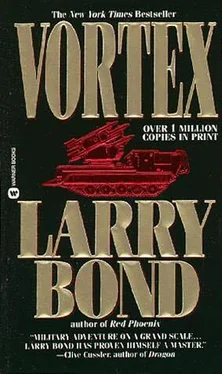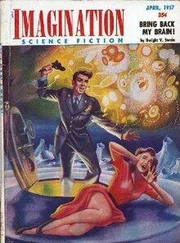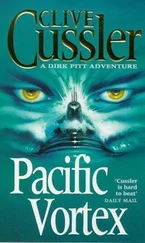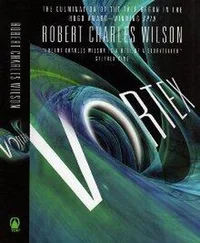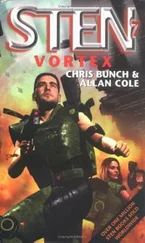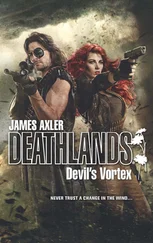But he was also sure the Cubans would try again-and soon. Probably at dawn.
Emergency reinforcements, scraped together from God knew where, had arrived shortly after midnight. He snorted. Reinforcements. A battery of
World War II-vintage artillery pieces and two companies of boys barely old enough to carry rifles. Barely enough men to replace those lost during the previous day’s fighting. Still, he’d thrown them into the line. Even boys with rifles were useful.
So far, Boerson’s “composite” brigade had survived air attacks, artillery barrages, and commando raids. And he’d used the last twenty-four hours of comparative quiet to rest his men and bolster their defenses. They’d even managed to fig mining explosives as command-detonated land mines.
The brigadier leaned over his map, studying his defenses for what seemed like the thousandth time. Was there anything more he could do?
Emplaced in an arc facing north and west of the city, his infantry were dug in deep in the stony soil, grimy and tired. Minefields and barbed wire covered the easiest approaches to their lines. He’d deployed the brigade’s single battery of 6-5 155mm guns on a low hill close to his front lines. From there, their shells could reach almost all the way back to Pietersburg. His two remaining missile launchers, each with three
Cactus SAMs left, guarded the guns. The newly arrived
artillery battery, with British-manufactured 5.5-inch guns that were half the size and five times the age of his 155s, covered the highway itself.
Finally, Potgietersrus’s local commando, unreliable as line infantry, were acting as scouts and snipers. They knew the area, and Boerson hoped to use their local knowledge to his advantage.
Yes, they could hold, but not to protect those fools in Pretoria, Boerson thought. They got us into this mess, and if we can survive, those idiots will be the first ones against the wall-Vorster’s brown shirted Brandwag notwithstanding.
Boerson turned to look at the other officers in the room. Two commandants and a colonel, each commanding a battalion, sat discussing the details of troop employment and artillery allocation, while a Brandwag monitor listened to every word, as though one of them were going to stand up suddenly and shout, “Long live the ANC.”
Groote Kempe, the commandant of the local commando, sat quietly in a corner. His men didn’t have radios or any heavy weapons except for some old Lewis machine guns. Their role was simple. Snipe at the enemy for as long as possible, then fall back to the main line of resistance.
The distant rumble of artillery fire served as a constant backdrop to their discussion. Harassing fire had been failing for the past twenty-four hours-small salvos designed to pin the South Africans in their positions, inflict a few casualties, and keep them short on sleep.
The tempo of the Cuban barrage suddenly picked up shells seemed to be raining down at the rate of three or four a minute. At the sound, the
South African officers looked up from their maps and discussion.
Boerson checked his watch: 0527 hours. A little early, he thought, but the Cubans probably plan to give us one hell of a pasting before they attack. Wonderful.
“Everyone, stand your units to. And tell your boys to make every shot count,” he ordered. Grabbing a helmet and a flashlight, he ran out into the night. Behind him, his battalion commanders scattered to their posts.
His headquarters occupied a two-story stone vacation home built near the mountain’s summit. In daylight, he had a view that stretched from one end of his line to the other. On a clear day, he could even make out Cuban-held Pietersburg as a blur far to the northeast.
Potgietersrus itself lay behind him. His staff officers kept complaining that he’d picked a spot too close to the front lines, but Boerson liked to see things for himself.
Night was just beginning to fade, with a thin line of pink appearing to the east. He could already make out the rugged landscape falling away to his front. Individual infantry positions were still cloaked in darkness, but he knew their locations. Bright flashes lit the skyline as Cuban shells burst over them.
The Cuban gunners were going for airbursts, he noted, a reasonable tactic considering how well his troops were dug in. Shells fused to explode on impact with the ground were ineffective against men in deep holes, unless one happened to land in the hole itself. But shells exploding twenty meters up could shower dug-in infantry with high-velocity fragments-forcing them to keep their heads down while armored troop carriers and tanks attacked.
It was light enough now for binoculars, and Boerson scanned the ground between Pietersburg and his positions. Yes, there they were. A dark wedge of dots moving toward him. Time to release the guns.
Stepping back into his headquarters, he said, “Order the one fifty-five battery to engage the enemy formation. Fuse for airburst. ” That would give the swine a little of their own back, he thought. It wouldn’t hurt their tanks much, but it would disrupt that pretty formation and give them something to think about.
He waited while the operator called the battery, located about eight hundred meters away. The man jiggled his receiver.
“Sir, there’s no reply,”
What? Boerson moved back outside, sweeping his binoculars toward his nearby artillery emplacements. He pursed his lips. Yes, they were being shelled, too, and by more airbursts. So much for concealment. The Cubans knew right where he’d hidden his guns.
Still, his gunners should have their battery fire-control center under cover. Had an explosion cut the telephone line?
Then, staring at the enemy barrage, he noted that the airbursts looked a little different. The explosions were smaller. Mortars, maybe? If so, when were the Cubans going to use their bigger guns? Each shell was also throwing off a tremendous amount of red-colored smoke. That was unusual.
Mixing smoke with high explosive was a common tactic, but not against artillery.
His signalman appeared in the doorway.
“Sir, Commandant Salter is on the line!” Traces of barely suppressed panic crept into his voice.
“He says his men are all dying.”
The brigadier leapt for the phone. What the hell was going on?
“Boerson here.”
“It’s gas… poison gas, bursting over us!”
My God. Gas. Of course. That explained the red mist and the small explosions. Each Cuban shell contained just enough explosive to scatter its deadly cargo over a wide area.
“Only a few of us have masks, and they don’t help anyway! Most of my men are already dead! I’ve got a mask on, but if I open up my vehicle, I’ll die from skin contact!” Salter’s abject terror came through clearly over the phone line.
“Pull back, George. Save yourself and anyone you can.” It was an automatic response, sensible in the circumstances but no less distasteful. Pulling back from the mountain meant abandoning
Potgietersrus to the communists.
The phone line went dead.
Boerson stood rooted in place, his mind in a mad, dizzying whirl. What could he do now? Salter’s infantry battalion and his best artillery battery were both gone. How much of the brigade had the Cuban poison-gas barrage hit?
He heard the crump of a muted explosion overhead, quickly followed by a handful more. His heart sank, and for the first time in his career, he hoped he was under fire by enemy high explosive.
Then he saw the mist drifting down toward him. Boerson wheeled to the white-faced, shaking signalman.
“Order a general retreat! “
He was too late.
The red-tinted cloud settled slowly around the headquarters building and all up and down the South African defense line. It was not a true gas, but an aerosol, a spray of extremely fine droplets created by the small charge in each shell. An artillery airburst wasn’t as uniform or efficient as a spray nozzle, but it worked well enough.
Читать дальше
